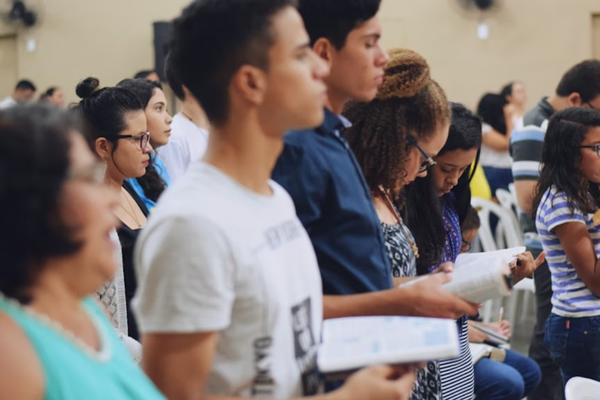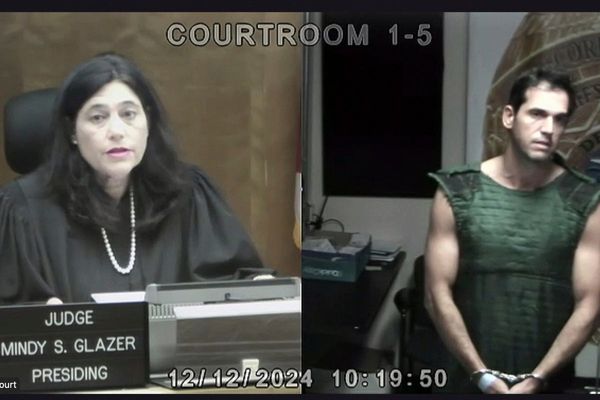A 10-year-old girl showed up for a routine check-in about her immigration case – and agents cuffed and detained her mother on the spot. A 14-year-old boy was shaken out of bed at 6am when plainclothes officers showed up, unannounced, at his door for what the agents claimed was a “wellness check”. A 17-year-old girl has been detained for months with her newborn baby due to new restrictions on who can sponsor unaccompanied minor immigrants.
Hundreds of thousands of unaccompanied children have arrived at the US southern border in recent years, seeking refuge. The Trump administration is now targeting them – and their caregivers – for deportation.
In the past few months, the administration has enacted a series of punitive policies to expedite the removal of unaccompanied minors and strip them of legal representation. It has attempted to tear down the basic rights and protections for children under the government’s care, while simultaneously issuing new restrictions on who can take custody of them – leaving children to languish in detention. In several troubling cases across the US, advocates say the children are being used as “bait” to arrest and deport the adults around them.
Taken together, advocates and lawyers say the changes represent a terrifying new strategy in the government’s crackdown on immigrants, designed to instill fear and chaos in families.
“The level and intensity of the attacks on children that we’re seeing currently is unprecedented in my legal career, which has spanned over 10 years,” said Marion Donovan-Kaloust, director of legal services at the Immigrant Defenders law center (ImmDef). “It’s not just one thing – it’s a concentrated attack on children from so many different angles. And it’s really shocking to the conscience.”
Children who come to the US without their parents – classified as “unaccompanied minors” by the government – have always been among the most vulnerable people navigating the US immigration system. Some, fleeing poverty, war, gangs, violence or environmental catastrophes in their home countries, have made the journey alone. Others become separated from their parents or guardians along the way.
During Joe Biden’s administration, when record numbers of children were arriving at the southern border, human rights advocates and internal government monitors raised alarms that children were held in overcrowded, jail-like facilities. Now, Donovan-Kaloust said, the Trump administration is attempting to strip these children of basic human rights and legal protections – exposing them to harm and isolating them from loved ones and lawyers who can advocate for their needs.
“Our team works with unaccompanied children every day who are detained, and we’re seeing an incredible increase in just the emotional distress that the children are expressing,” said Donovan-Kaloust. “They’re talking about how they’re not able to sleep, not able to eat. They’re crying a lot, unable to participate in attorney-client meetings.”
Maria’s arrest in front of her daughter
In Santa Paula, California, one family experienced the compounding consequences of the administration’s new policies.
Maria, the primary caregiver and sponsor for her 10-year-old daughter who had arrived in the US as an unaccompanied minor, didn’t have any legal status in the US. But she had submitted all the required documents to show that she was a safe caregiver, provided fingerprints and opened her home up for vetting from officials at the Office of Refugee Resettlement (ORR).
On 2 April, she took her daughter in for a routine check-in at a nearby immigration office. Agents arrested her on the spot. “They arrested her in front of her 10-year-old,” said Primitiva Hernandez, the executive director of 805 UndocuFund – a non-profit that has been helping the family navigate their immigration cases.
Within hours, Maria was transferred to a detention center in Otay Mesa – nearly five hours away. When volunteers from 805 UndocuFund realized what had happened they rushed to help Maria’s mother, Lilia, drive over to the immigration office and pick up her granddaughter. Lilia also took custody of Maria’s two-year-old son.
The Guardian is not printing the women’s last names, or naming the children, in order to protect their safety and privacy.
After Maria’s arrest, things took a turn for the worse. Lilia’s case for asylum in the US was denied, and she was told to return to Mexico immediately. “I have to leave, because if I don’t leave, they’ll come looking for me,” Lilia said in a video message she shared with the Guardian. Her granddaughter was already distraught after seeing her mother cuffed, and whisked away by agents. Immigration and Customs Enforcement knew where she lived – she didn’t doubt they would come knocking.
“I have two children at home. I want to spare them the trauma,” she said. “My little girl keeps crying because of how they grabbed her mother … I want to stay for my daughter and my grandchildren, but I just can’t.”
The children were sent to stay with other family members – but some of those relatives are immigrants too, and they worry they could be targeted for enforcement next.
Advocates say that these sorts of cases exemplify how unaccompanied children are becoming both targets for immigration enforcement – and collateral, as immigration agents move to seek and arrest the adults who care for them.
In a leaked Ice document, agents were instructed to first locate children who have been released by ORR into the care of relatives, and then evaluate whether they can be removed from the country. Officers are advised to seek out “unaccompanied alien children (UAC)” who could pose potential threats to public safety, and to look for “UAC with gang or terrorist ties/activities”, according to the document. Ice officers were also told to both remove children who may have missed an immigration appointment, and to target sponsors who are not of blood relations.
At the same time, the Department of Homeland Security (DHS) has enlisted the FBI and other criminal investigators to conduct “wellness checks” on children and young people who came to the US without their parents – alarming and unsettling children who have encountered armed agents at their homes.
In New York, plainclothes officers banged on a mother’s door at 6.30am one morning in April, asking to speak to her 14-year-old son, who had entered the US as an unaccompanied minor. “It didn’t cross my mind that it was immigration,” she told the Guardian. “I opened the door and one of them showed me the phone and there was a photo of my son.”
So, she woke him up – and they asked him some questions. Later, they said something about a pending court hearing – but her son didn’t have any upcoming hearings because his petition for asylum had been approved.
The Trump administration has said these surprise visits are meant to ensure that the children “are safe and not being exploited”, according to a DHS spokesperson. Trump has falsely accused the previous administration of losing more than 300,000 migrant children, claiming that they are “slaves, sex slaves or dead”.
Agents have even shown up on school campuses. In April, federal officials with the DHS attempted to enter two elementary schools in Los Angeles and asked to speak with five students – but school officials denied them entry. “What interest should a homeland security agent have in a first-grader or a second-grader? A third-grader or a fourth-grader, for that matter?” said Alberto Carvalho, then-superintendent of the Los Angeles Unified school district.
Advocates say the visits have done little other than unnerve families. “Ice is basically using those addresses from the Office of Refugee Resettlement to go door to door and instill terror,” said Ann Garcia, staff attorney at the National Immigration Project.
New DNA testing required for sponsors
The government has struggled for years to shelter and care for the thousands of unaccompanied minors who arrive in the US. But the Trump administration is exacerbating the problem by making it exceedingly difficult for relatives to take custody of children in ORR facilities.
Under new policies implemented in January, anyone seeking to sponsor unaccompanied minors will have to meet stringent new requirements for DNA testing and documentation. It has become nearly impossible for undocumented people to take custody of their children.
In a lawsuit challenging the policies, advocacy groups said the “changes have resulted in children across the country being separated from their loving families, while the government denies their release, unnecessarily prolonging their detention”.
One of the plaintiffs in the lawsuit is a 17-year-old girl, referred to as Angelica, who arrived pregnant at the US southern border in November. ORR has refused to release her – and her newborn baby – to her older sister Deisy’s custody, because her sister did not have required documentation, including a passport with an attached immigration document.
Some of the other relatives Deisy has approached to sponsor Angelica have been too afraid to provide their information to ORR, fearing that the agency will share information with immigration enforcement agencies.
Another plaintiff, 14-year-old Eduardo, has been held with his seven-year-old brother in a transitional foster care program for months, while his mother Rosa has tried to submit all the documents needed to take custody of them.
“It’s heartbreaking,” said Donovan-Kaloust of ImmDef. “These are children in pain, they don’t understand why they can’t be with their families. And we can’t really explain it to them, because there’s not a good justification for what the government’s doing.”
Meanwhile, the government has tried to wrench funding for programs that provide legal representation for unaccompanied immigrant children – leaving tens of thousands of infants, toddlers and teenagers to represent themselves in immigration court. After ImmDef and other legal aid non-profits sued to challenge the move, a judge ordered the administration to temporarily restore the funding – saying that denying children legal counsel violated an anti-trafficking law – but the administration has aggressively appealed.
Already, only about 50% of unaccompanied children have any legal representation in immigration court. Now, advocates say toddlers and teens alike are increasingly having to appear before an immigration judge by themselves – with little understanding of what is going on.
Judges, meanwhile, are left to explain to confused kindergarteners and intimidated teens that the government of the US will decide whether they have to leave, or whether they can stay. Children without lawyers are much more likely to be deported.
“These children are truly alone. They have no one to speak for them,” Donovan-Kaloust said.
At the same time, the government has tried to more swiftly remove unaccompanied children from the US, scheduling deportation hearings almost immediately after they are taken into ORR custody – sometimes before they have had a chance to recover from their journeys, she said.
“There’s so many things happening right now,” Donovan-Kaloust said. “So the attacks are layered on top of each other in such a way that everything is priority – at a time when our resources to respond are being systematically curtailed by the administration.”







